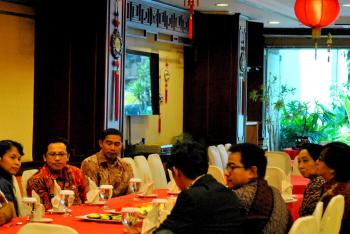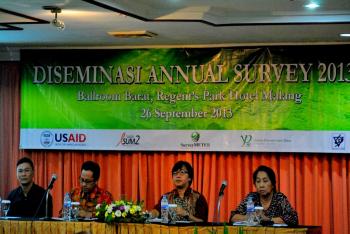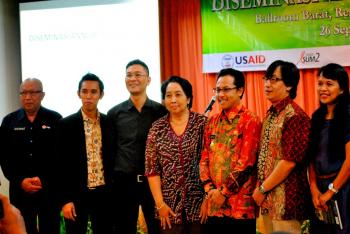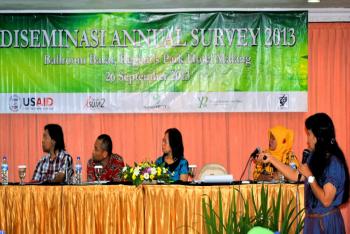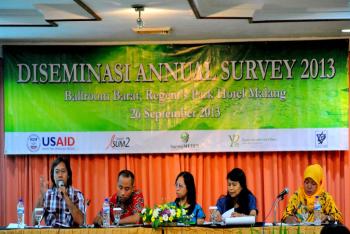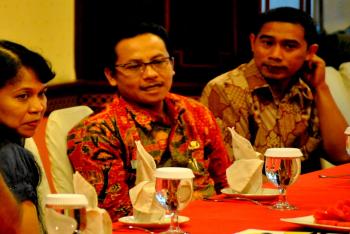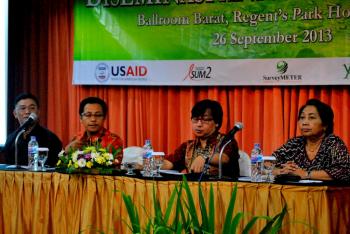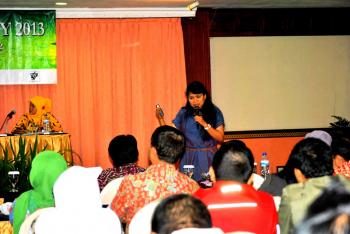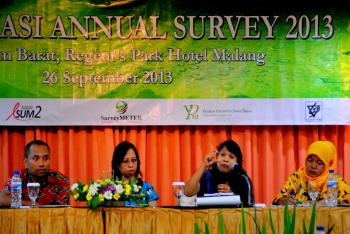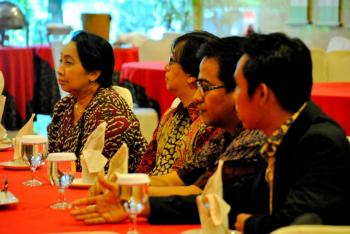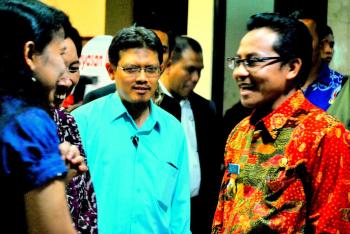
Dissemination of the 2013 HIV AIDS Annual Survey in Malang
- Tanggal : 26/09/2013 - 26/09/2013
- Lokasi : Ballroom Barat Regent’s Park Hotel Malang
The HIV AIDS Annual Survey 2013 dissemination was held on September 26, 2013, at the West Ballroom of Regent's Park Hotel Malang. It sheltered a more regional target scoping for the dissemination participants, which are institutions and stakeholders in the Greater Malang area, covering the district and city of Malang and Kediri, and the district of Pasuruan.
Based on the organizing structure of the program, USAID is a donor, SUM2 through SUM Regional East Java as the technical implementer, SurveyMETER as a mentor for survey implementation to dissemination, and PARAMITRA Foundation and IGAMA Foundation as CSO participants and program implementers. The dissemination in Malang was considered a success due to being able to present the main and competent stakeholder: the Deputy Mayor of Malang, as well as cause to be present the representatives from academia and related SKPD from the Greater Malang area. The objectives of this activity are:
- Presenting the research results conducted by CSOs concentrating on the issue of HIV and AIDS in East Java, especially in the Greater Malang area.
- Discusses how far research results are able to be implemented for the development and improvement of HIV and AIDS prevention programs in Indonesia, especially in the Greater Malang and East Java areas.
Dr. Mainul Sofyan (The representative of the USAID-SUM Program who is the SUM2 Regional East Java head) and Bondan Sikoki SE, MA. (The chairwoman of the board of directors of SurveyMETER) delivered speeches. Dr. Mianul, in his speech, expressed his gratitude for the presence of the Deputy Mayor of Malang, Drs. Sutiaji, because of his presence supports the activists of the HIV AIDS prevention program in Malang City in particular, and the presentation given by the CSO is a constructive input for this program. Mrs. Bondan asserted that the purpose of the Annual HIV AIDS Survey was to see how the impact of the CSO mentoring and outreach program on the vulnerable population to the spread of HIV AIDS in the Greater Malang area. In accordance with her, this Annual Survey was purely carried out by CSOs, SurveyMETER only assisted in making tabulations for this dissemination activity.
In his remarks and opening ceremony, the Deputy Mayor of Malang, Drs. Sutiaji conveyed many things about the problem of dealing with HIV AIDS. First, he explained the functions and duties of human humanity as God's caliph (representative) on earth to convey virtue and help fellow human beings regardless of origin and circumstances, including serving people with HIV AIDS. Second, he conveyed a glimpse of the open society of Malang City, and the level of urbanization that is sufficient for us to support the spread of HIV AIDS in Malang City has increased drastically. Third, the budget for handling HIV-AIDS problems already approved by the Malang City House of Representatives would be sufficient and not only be attached to the Health Service and Education Office but would be a separate post through The National AIDS Commission of Malang City, he explained. Fourth after completing this dissemination activity, the HIV AIDS community and the government work units were recommended to sit down and offer a collaborative presentation to the Deputy Mayor regarding what actions should be taken next.
Furthermore, Asiah Sugianti, a social activist in the East Java region, hosted as the moderator at the main event of the presentation of the results of the Annual HIV AIDS Survey. The four speakers were from the PARAMITRA Foundation, the IGAMA Foundation, SurveyMETER, and the FHI SUM1 Program. The first presentation from the IGAMA Foundation related to research conducted on assisted groups from the male sex with men (MSM) community concluded the data findings that in the MSM community, especially in Greater Malang:
- Comprehensive knowledge of HIV is highest at the level of the group with a high school education of 67% and the lowest with a junior high school education of 9%.
- The risk behavior of transmitting STI HIV AIDS in the MSM community during anal and oral sex intercourses is still quite high (59%).
- The level of condom use of respondents when having sex in KD (59%) is higher than respondents in non-KD (38%)
- Based on respondents' health service-seeking behavior, the IGAMA foundation found a significant impact of program intervention to the level of visits to the KD HCT test was similar on the level of visits to the KD STI was higher than the non-KD respondents.
- There is a significant effect on the frequency of visits by PL CSO IGAMA on the respondent's health service seeking behavior.
The presentation of the results of the fifth research in session two from the Malang PARAMITRA Foundation with assisted groups from the FSW and Shemale communities concludes the data findings that the established KD and non-KD respondents have provided a broader view of behavioral situations related to HIV and AIDS in the ongoing program. Hopefully, this information will contribute to the process of developing a scientifically proven AIDS response program based on the key findings:
- comprehensive knowledge about HIV and AIDS is still low
- the use of condoms when having sex with a boyfriend or partner is still higher than that of guests or customers
- the majority of respondents who have used STI services and are already accompanied by HIV testing services indicate that STI and HIV services have been running
Meanwhile, the explanation of the SurveyMETER research results, conveyed by Dr. Ni Wayan Suriastini, M.Phil, summarized the entire research in terms of the Intervention Program Correlation with MARP Knowledge and Behavior, which resulted in positive data, namely:
- Comprehensive knowledge of FSW, Shemale, and MSM is positively correlated with face-to-face outreach programs
- For the IDUs, access to the internet and social media has a very positive impact. So that it becomes very potential to try out the dissemination of information through social media
- For the paid sex workers, their education level and age determine whether they will use a condom or not
- The STI examination is positively correlated with the regular outreach and edutainment programs.
- Especially for MSM, check regular IMS also related to programs via the internet and SMS/BBM/WhatsApp messaging.
- Consistently for the last 6 months, the outreach and edutainment programs are positively correlated with behavior for all types of KD in order to carry out HIV testing.
- Especially for MSM, It was also significant with the communication program until the face-to-face direct outreach was very influential in order to check for HIV or non-KD.
The presentation of the study from FHI SUM1 regarding the measurement of condom coverage, coverage quality, and condom access in a number of FSW hot zones in the district of Malang using GPS and GIS applications concludes:
- Condom coverage, especially in places of localization, still needs to be increased from 70% to at least 90%
- The needs to improve access to condoms within the hotspot and within 10 meters
- The distribution of subsidized condoms needs to be more intensive in the non-places of localization market segment, more to WPSTL. There are many independent outlets at the Venue
- It seems needs to increase in the stock of condoms and condom promotion media
In the response and discussion section, a suggestion is made to produce data from the results of this annual survey that has not been submitted. Representatives from Malang City KPA conveyed their objections to data on comprehensive knowledge and low KD behavior changes that were out of sync and seemed to deny the work of Malang City KPA in the field. In fact, from various intervention activities, there has been a significant change in behavior for the examination of STIs in Malang City so far. Other respondents challenged how CSOs work in assisting and reaching out if the data produced is not significant. Moreover, if you look at their KD behavior, FSW with customers have a higher frequency of using condoms than with their own girlfriends/partners during intercourse.
It is understandable that the mentoring and outreach efforts are not directly proportional to the data obtained from the feedback since the commercial sex is done in a very private place. Moreover, the bargaining power of FSW is very low for sex lovers. The percentage of using condoms is greater when having sex with non-partners, which proved contrary low if compared with permanent partners who already possess emotional bonds and trust. In general, for the results of the Annual Survey in East Java, the level of comprehensive knowledge is low but the examination is quite high.
What CSOs have done so far must have an evaluation of whether it is effective or not by several reviews that can be drawn from this dissemination in Malang City. The extent to which, for example, inspection behavior is not significant with the rules, use, and availability of condoms. To what extent the merchantability of condoms can be under control? whether they are used in the room or not? Why is the use of low KD condoms? Is it necessary to expand the program that not only reaches KD but also their partners? Basically what CSOs do will mean nothing if there is no mutual assistance. CSOs or NGOs have many limitations, just like the offices which have limited resources. Besides that, income problems are also correlated with knowledge, so efforts to empower the KD economy are also needed.
Several recommendations were made from the results of the review for dissemination in Malang City as follows:
- Increasing outreach programs to at-risk communities to support efforts to increase comprehensive knowledge and change behavior.
- Development of outreach and mentoring strategies for closed at-risk groups in accessing information and health services for STIs, HIV, and AIDS.
- The need for new breakthroughs and the use of information, communication, technology (ICT) to support the program.
- The importance of support for sustainability to Civil Society Organizations related to HIV AIDS prevention programs to minimize dependence on funding from foreign financing.
- The importance of increasing understanding of KD and health care workers regarding consent when planning to perform an HIV test as a form of treatment for the code of ethics in counseling.
- The importance of community participation in forming local agreements in order to create a conducive environment and as an effort to monitor FSW, especially in terms of health.
- The provision of knowledge information needs to be more focused and stronger, for example in comprehensive knowledge and condom negotiations.
- Finding and testing innovative outreach methods, such as using information media via cell phones for FSW and Shemale.

